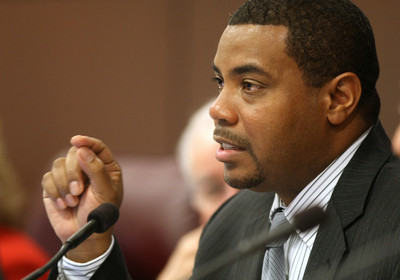Save program, Senate chief asks

CARSON CITY — Senate Majority Leader Steven Horsford struggled to hold back tears Thursday as he pleaded with fellow lawmakers to restore funding to a library program for disadvantaged youth in his district.
Horsford, Assemblyman Marcus Conklin, D-Las Vegas, and others also complained during the Assembly-Senate budget hearing that cuts proposed by Gov. Jim Gibbons could leave the state library in Carson City without Nevada newspapers and other publications for patrons to read.
An emotional Horsford, D-Las Vegas, told how he recently spent a Saturday at the West Las Vegas Library watching young people describe the problems of drug use and violence in their neighborhoods and steps they are taking to improve their lives.
They attended a spring break program for disadvantaged youth funded by the Nevada Humanities Commission, a program that Gibbons has proposed to eliminate.
In it, students are encouraged to act out as if in a play about the experiences in their lives.
“They were sharing their experiences having grown up in a bad environment,” said Horsford, who grew up in the predominantly poor and minority area surrounding the library near Martin Luther King and Lake Mead boulevards.
“The idea we cannot fund this for these kids is pathetic. I agree we don’t have the money and we have to hit a mark, but there are some things I will not cut.”
Though Horsford had to stop and regain his composure, his fellow legislators got the message.
They agreed to put $50,000 a year back into Gibbons’ budget and retain half of the disadvantaged-youth program.
The state library did not fare as well. Legislators backed Gibbons’ plan to cut in half a $300,000-a-year budget for the purchase of periodicals, such as newspapers, and access to online databases.
State Librarian Daphne DeLeon said she did not have a list of the publications that would be dropped but said staff will try to continue to stock copies of all Nevada newspapers.
“What is the point of having a library if you have no materials in it?” Horsford asked.
If lawmakers approved Gibbons’ budget, Horsford and Conklin said, then future researchers might find nothing in the state archives about the 2009 legislative session.
“Who will be able to find out what we did during the 2009 session when we had the worst budget deficit in the country?” Horsford said.
He said Nevada state government faces the most extreme cuts of any state in the country, and yet what happens in the Legislature might not be cataloged and filed in the archives because of lack of staff.
Michael Fischer, the state Department of Cultural Affairs director, who supervises the state library and archives, said he hopes newspapers will donate free copies.
He suggested that libraries around the state could save money by buying publications in bulk.
“We hope to restore everything when the economy recovers,” DeLeon said.
Legislators voted to restore the four positions to the state archives that Gibbons sought to eliminate in his budget. So instead of forcing the archives to be closed except by appointment, they would be open four hours a day for the public. Staff also would be available to catalog and file current records, such as records of the 2009 Legislature.
Legislators are struggling on how to deal with a budget that Gibbons said is $2 billion short of what would be needed to keep state services at the levels contemplated in 2007.
But Horsford said that because of declining revenue, the $6.17 billion, two-year budget Gibbons proposed is another $500 million short.
In an interview Thursday, he questioned whether residents realize how severe a crisis that state government faces. Legislators will have to find that $500 million before they can begin to restore cuts to Gibbons’ budget, he said.
Democratic leaders have said that decisions on whether to raise taxes will not be made until after the May 1 meeting of the state Economic Forum, which determines how much revenue state government will have to spend over the next two years.
Gibbons also wants to cut the operations of most state museums to four days a week, from the existing seven days a week.
During the hearing, Assemblyman Mo Denis, D-Las Vegas, said a decision on whether to keep museums open every day will not be made until near the planned June 1 adjournment of the Legislature.
“We are in a bad situation,” Denis told a group of schoolchildren who observed the hearing.
Contact Capital Bureau Chief Ed Vogel at evogel@reviewjournal.com or 775-687-3901.












